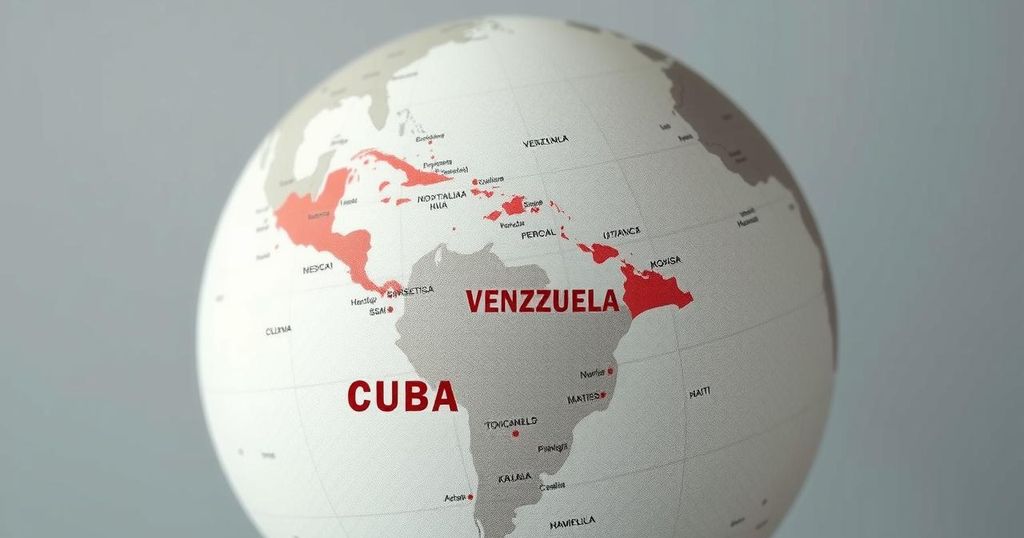Trump Imposes Travel Bans on Haiti, Cuba, and Venezuela Amid Immigration Crackdown
President Trump announces a full travel ban on Haitian nationals and partial restrictions for Cubans and Venezuelans starting June 9. The move is part of a broader immigration crackdown, citing national security concerns. Exceptions apply to certain visa holders, but some families may be affected. Community leaders express outrage, describing the ban as discriminatory and harmful to U.S. relations with Haitian families.
On Wednesday, President Donald Trump unveiled a sweeping travel ban that completely blocks Haitian nationals from entering the United States while also imposing partial restrictions on individuals from Cuba and Venezuela. This measure is part of a larger crackdown on immigration stemming from those countries. The proclamation signals an escalation in the government’s efforts to tighten immigration protocols, especially in light of concerns about inadequate vetting practices.
The travel ban is set to take effect on June 9, as stated by the White House announcement detailing these new regulations. The decree fully restricts Haitian nationals from entry into the U.S. and significantly limits immigrants and non-immigrants from Cuba and Venezuela, particularly affecting those traveling on business, tourism, or educational visas. Notably, valid visa holders are exempt from the new restrictions.
The proclamation not only affects citizens of these three countries but also extends to other nations facing full bans, including Afghanistan, Iran, and Libya, among others. The partial ban encompasses countries like Burundi and Laos. The rulings apply to individuals outside the U.S. without valid visas as of the proclamation’s effective date.
Exceptions for the ban exist, including green card holders and immediate relatives of U.S. citizens. However, families hoping to reunite with older children or siblings caught in the ban may find themselves affected. “The United States must be vigilant during the visa-issuance process to ensure that those aliens approved for admission into the United States do not intend to harm Americans or our national interests,” Trump stated in the official announcement.
Every 90 days, both the State and Homeland Security secretaries are tasked with reassessing whether to maintain or lift such travel restrictions. This review process is expected to start after the full ban takes effect, providing limited opportunities for modification.
At an event in Boston, reactions varied, with many expressing outrage over the targeted restrictions, particularly toward Haiti. Brian Concannon of the Institute for Justice and Democracy notably remarked on the implications of the ban, stating, “Singling Haiti out for special treatment provides no protection to U.S. national security but is another in a long line of transparently racist attacks against Haitians.”
The proclamation cites concerns over terrorism and crime as the justification for these measures, with Trump arguing that Haiti lacks the necessary systems to prevent national security threats. Pointing to Cuba as a state sponsor of terrorism and Venezuela’s deficient governance, the administration seeks to bolster its stance on protecting U.S. interests.
Yet, critics argue that this policy fails to reflect the realities on the ground. Independent reports, for example, showed that over 4,600 Venezuelans had been deported just in recent months, contradicting claims regarding deportee management from those nations. The existing diplomatic tension between the U.S. and Venezuelan authorities complicates the issue further.
While the bans seek to tighten entry protocols, community leaders stress the detrimental effects on families reliant on a bi-national relationship. Pierre Imbert captured this sentiment, saying, “Access to the United States is key to sustaining families,” criticizing the ban’s implications on vital familial and economic links.
In a broader context, Trump’s recent decision marks a continuation of his administration’s hardline immigration policies, including previous travel bans against several Middle Eastern countries. This latest action has raised alarms among human rights advocates who claim it exacerbates xenophobia and targets vulnerable populations.
Robyn Barnard from Human Rights First condemned the ban, emphasizing the harm it causes to asylum seekers and those reuniting with loved ones in the U.S. She added, “Bans do nothing to make our country secure but rather undermine our national security.” As the fallout from these decisions unfolds, many await clarity on policies affecting over half a million Haitian residents currently protected by Temporary Protected Status, underscoring the turbulent landscape of U.S. immigration policy.
President Trump’s latest travel ban significantly impacts Haitian nationals and partially limits entry for those from Cuba and Venezuela, further stoking immigration tensions. Despite exceptions for valid visa holders and family connections, the ban raises concerns about human rights and the potential for further disenfranchisement of vulnerable populations. Responses from community leaders and advocacy groups suggest significant backlash against the continued pattern of restrictive immigration policies. Overall, this proclamation represents yet another chapter in a tumultuous U.S. immigration narrative, leaving many in uncertainty about their future.
Original Source: www.yahoo.com




Post Comment